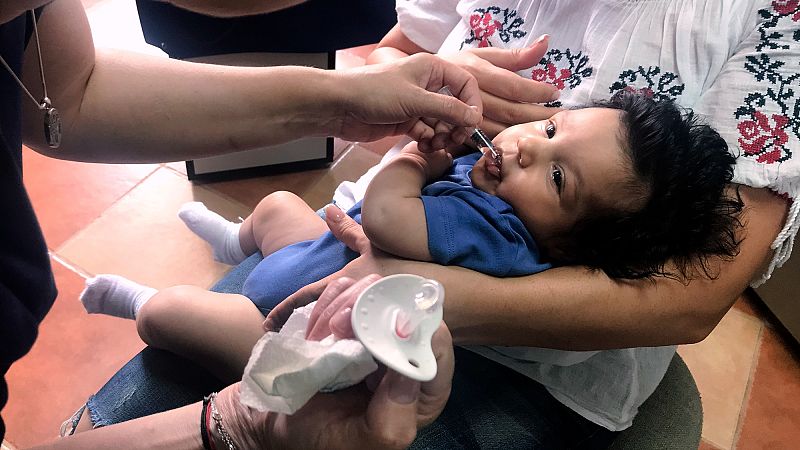
Romania’s measles epidemic had been dragging on for nearly three years when Dr Claudia Cojocaru was infected by a patient while working in the infectious disease unit at a Bucharest hospital in 2019.
The disease – one of the most contagious in the world – hit her hard, even landing her in the same hospital where she worked.
It wasn’t until Cojocaru recovered and had her second daughter almost a year later that she realised her illness would change the trajectory of her career, turning her into a vocal proponent of vaccines in a country rife with health misinformation, anti-science politics, and a struggling medical system.
“I got to know measles very intimately,” Cojocaru, a neonatologist who is also training in family medicine, told Euronews Health. “[Now] I’m the one [parents] call when they have mixed messages”.
Romania has the lowest rate of measles vaccination in the European Union, with just 62 per cent of people fully immunised as of 2023.
That’s far below the 95 per cent threshold needed to prevent measles infections among those who cannot be vaccinated, such as babies and people with weakened immune systems.
The consequences are more deadly outbreaks. Romania’s last measles epidemic ended in 2020, but the government declared another one in December 2023.
About 31,000 people were infected and 22 died last year, with 44 per cent of cases among unvaccinated children under the age of 5. There is no specific treatment.
But while Romania’s outbreak is the largest in Europe, it’s far from the only country where measles has a foothold.
Italy, Germany, Belgium, Austria, and France have each reported hundreds of cases over the past year, and infections are expected to rise in the coming months.
That means Romania’s latest measles crisis may be a harbinger of outbreaks to come elsewhere in Europe.
“The challenge is all over the region,” Dr Dragan Jankovic, who leads work on measles elimination for the WHO’s Europe office, told Euronews Health.
“2024 was the worst possible” year for measles in Europe since the 1990s, he added. “That's why we need countries again to take action and start immunising those who are not immunised”.
Why vaccination rates plummeted
Until 2013, Romania’s measles vaccination rate was on par with or even higher than many other EU countries.
But immunisations fell in the 2010s due to a “surge” in vaccine hesitancy, delayed immunisations, children being lost to follow-up appointments when their families moved, a low supply of vaccines, and the haemorrhaging of doctors from the country, according to a study led by the national public health institute.
“It's like this perfect cocktail brewing ahead of an epidemic,” Dr Stefan Dascalu, an immunologist at Oxford University who is originally from Romania but was not involved with the study, told Euronews Health.
“If you leave one of these problems untreated, it metastasises”.
The COVID-19 pandemic proved fertile ground. Like in many other countries, vaccine misinformation and conspiracy theories led to broad scepticism of public health, creating a wave of anti-science rhetoric that helped elevate three right-wing political parties to the Romanian parliament, where they now control about a third of seats.
“God is not vaccinated,” Diana Sosoacă, the SOS Romania party leader, said during a speech last year. She was barred from running in the recent presidential election after a court deemed some of her comments “contrary to democratic values”.
In the years since the pandemic, public confidence in routine childhood immunisations has plummeted in Romania.
For Cojocaru and other vaccine advocates in Romania, online conspiracies and anti-science politics are only half the battle. They’re also up against anti-vaccine health workers – and sometimes, the medical establishment itself.
Romania’s medical system is under-resourced; the country spends 5.8 per cent of its gross domestic product (GDP) on healthcare, roughly half of the EU level. It’s also still grappling with a legacy of corruption from the Communist era.
“You will still find this general perception that if I go to the doctor, I need to give them a small bribe… because otherwise they won't take care of me,” Dascalu said.
People often believe doctors are “corrupt or making a lot of money or sponsored by pharmaceuticals, [which is] a very complex thing to address,” he added.
Further, measles vaccines are free and recommended for young children, but they aren’t mandatory. And while medical students learn about the history of vaccines, they aren’t always trained on how to administer them to patients.
Meanwhile, some health workers give patients incorrect information about vaccines and their potential side effects, and they often do not tell people which vaccines are given for which disease or when patients should return for follow-up appointments, according to a 2019 study that followed vaccine consultations at clinics across Romania.
Officials from Romania’s National Institute of Public Health did not respond to Euronews Health’s information requests.
When patients raise concerns or even conspiracy theories about vaccines, Cojocaru said she tries to stay calm and neutral, explaining that immunisations like the measles, mumps, and rubella (MMR) vaccine are some of the best-studied and safest pharmaceuticals.
Cojocaru also tells her patients that she vaccinated her two children, ages 5 and 7, who are both healthy.
“I try not to push or mock them,” she said. “I tell them they don’t need to make a decision now, my messenger is always open. If they have concerns, they can ask me”.
Implications for Europe
No matter how many families Cojocaru persuades to get immunised, it won’t be enough if there are still pockets of unvaccinated people as the disease is so contagious.
During Romania’s last measles outbreak, people without health insurance, those living in poverty, one-parent families, and the Roma ethnic community were particularly vulnerable, according to the national public health institute’s study.
But “no single country is safe from the importation of the virus,” Jankovic said. “When you have the virus [imported] in the country, if that reaches susceptibles, you will have cases, and unfortunately maybe outbreaks”.
Only four EU countries – Hungary, Malta, Portugal, and Slovakia – have measles vaccination rates of 95 per cent or higher.
In many countries, the pool of susceptibles appears to be growing. Routine child immunisation levels have fallen worldwide since the pandemic, prompting global health groups to launch a promotional campaign called the “big catch-up” in 2023.
Jankovic said that generally, countries that fared better during the pandemic – such as those with a stronger healthcare system, clear public health messaging, and consistency in the pandemic response – appear to be on track with routine childhood immunisations.
But some countries with poorly coordinated responses, conflicting guidance, and more strained healthcare services now seem worse off, he added.
“If you have confusion … that is automatically affecting not only that vaccine, but also other vaccines which are already in the system,” Jankovic said.
Without a long-term commitment to boost confidence in public health programmes and get children vaccinated against measles and other diseases, experts said Romania’s challenges could crop up elsewhere in Europe.
“We are now at risk of losing all this investment,” Jankovic said. “If those trends of doubting vaccination become global, then we are in a big problem”.







